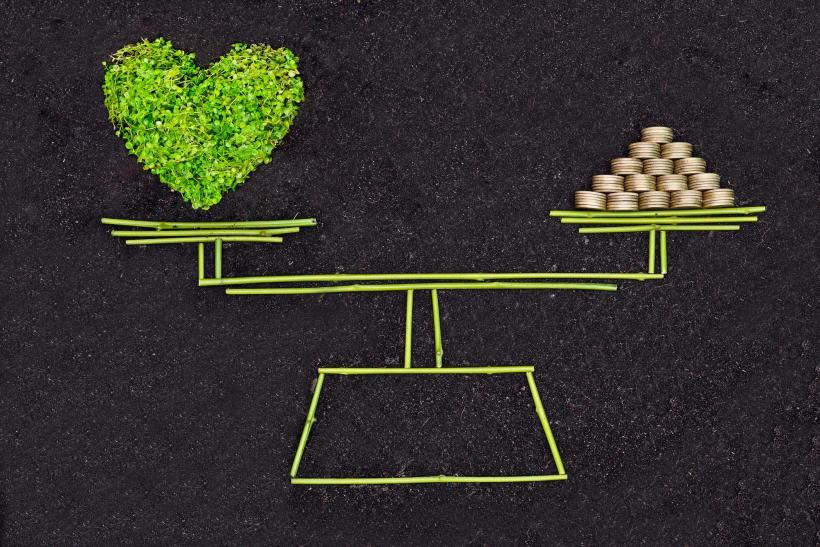
There are no good or bad foods so let's stop moralizing food.
Morality. It’s a sticky subject these days. Between our current political climate and unpacking centuries of historical oppression and repression, I think it might be helpful to pause and debunk some cloudy morality issues. We are waking up to a clearer and more defined moral reality every day, even though it’s been bubbling and rising for a very long time. It’s exciting to see the shift happening, even when it’s painful, enraging, and at times, deeply triggering.
We need this movement forward, though. Even in small steps and slow unraveling.
But can we chat about the things that we have made moral that actually are not? Call it a throwback to the Puritans or Victorians, or even take it all the way back to the Crusades. We’ve assigned meaning to certain objects and concepts and have viewed them as good or bad, instead of what they really are: neutral.
1. Money
Yeah, I’m just going to jump right into the boiling soup of Things We Don’t Like To Talk About Publicly. Personal finance is perhaps the most angst-ridden conversation topic known to humanity. And for good reason. Unlike sex, we actually NEED money to survive in our modern life. But we’ve taken it too far and have created a whole web of morality around it.
Debt is bad, assets are good.
If you are struggling to make ends meet, you’re in a bad place.
If you can easily pay your bills and have more left over to do awesome things, you’re in a good place.
Poor = bad, wealth = good. Your money, your assets, your credit score, your income to debt ratio, your savings account, or lack thereof, do not make you a good or bad person.
Money is a resource.
It’s a thing we use to live. Debt and assets will fluctuate over your lifetime. You can be broke and happy. You can be rolling in actual piles of cash and be miserable. Don’t confuse your moral compass with your bank account. Money is just a tool, and just like anything other tool, learning how to use it might take a lifetime of lessons, and that’s okay. You are not a bad person if you need to learn hard lessons, and you’re definitely not a bad person if you were never given the instruction you needed to learn how to use it early on in life.
2. Food
Guess what? There are no good or bad foods. There are foods that have negative consequences, like hemlock. Other foods will break down your cells, like an over-consumption of sugar. Other foods will apparently cure everything, like coconut oil and kale.
We've blurred the line of what food does to or for our bodies with what is righteous.
Clean eating, dirty dozen, etc. We have given our food a moral code and when we eat something that delights us, we are bad. When we eat something “healthy”, we are good.
This is utter nonsense.
The only things we need to know about the food we are eating is how they make us feel. My son has severe food allergies. One of his biggest triggers when he was little was avocado. It sent him into hypovolemic shock, and even now, he doesn’t do so well with latex foods. However, a sugar-laden popsicle doesn’t seem to faze him and he will eat his weight in salmon and broccoli. My son eats what makes his body feel good and avoids the foods that his body negatively reacts to. He is not good or bad based on what he eats, and neither are you. Food is a resource, not a judgment.
3. Fitness
In our fitness obsessed culture, we are expected to be in peak condition as women. Had a baby 4 days ago? Better get back to that gym. You were “bad” and ate two cookies at that party? The only way to atone for your food sin is to do two barre classes in one day. Oh, you CAN’T climb that mountain (even though you have no desire to actually climb it), well, you’re weak and weakness is a moral failure.
Fitness is such a slippery concept that it’s impossible to maintain the unrealistic ideals forced upon us by marketing and diet culture. This is a multi billion dollar business and if you think for one second that someone will provide a realistic-for-you goal, you are drinking the kool aide. Your body is not bad. Its current state is not bad. Just like food, you have to do the things that feel right for you, move in ways that create the physical dynamic you desire. But being physically fit is not an indicator of your moral aptitude.
4. Time
Um, this is a perhaps the most difficult thing to unpack for me. I’m a chronic procrastinator. I find that I actually do feel more powerfully productive with a deadline looming, so to keep these good productive feelings going, I overschedule things so I always have a deadline on the horizon. Because somewhere along the way, I learned that “wasting time” by resting, or taking my time to complete a task, or doing something enjoyable is lazy, and lazy = bad. Packing my day with productivity is virtuous. Idle hands are the devil’s workshop and The Baby Jesus knows we don’t need more evil in this world.
Time, like money, is a resource.
What you do with your time is not a cause for moral concern. Resting, playing, giving yourself permission to just fall into the boredom abyss, is not a sign of rotten character. In fact, it can be a sign of caring for yourself, exploring your creativity, or honoring your own inherent pace. On the other end of that spectrum, being busy all the time is generally considered to be bad, even though our society often silently demands that of us. It’s a no-win situation and in our efforts to be good, we have to utilize every moment of our time, except if we are utilizing too many moments and then we are bad. But give no bothers to this, my friends.
Time is not moral. You cannot hurt its feelings or do anything to harm it. You can only use it in ways that make sense for your own life and responsibilities.
So, dear friends, go forth and consider a world where money, food, fitness, and time are no longer containers or beacons for morality. We are all learning our lessons and we can trust that process without judgment.








